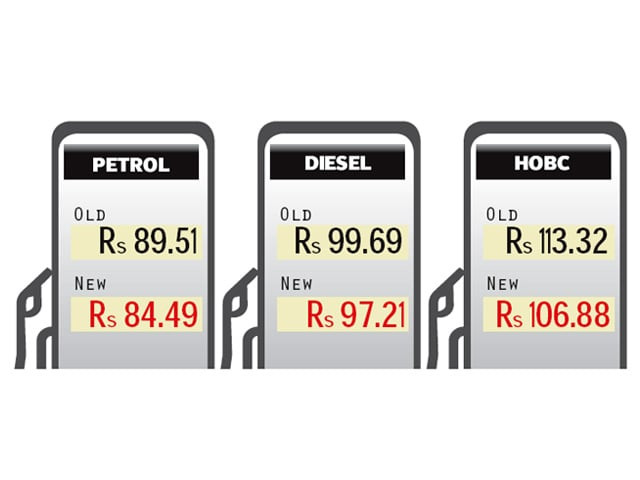Fuel prices come down by Rs6.44 per litre
CNG lowered by Rs4.59 per kg; gas rates for domestic consumers halved.

As global oil prices continue to decline, and elections in Pakistan approach, fuel prices in the country were slashed by up to Rs6.44 per litre.
The cuts were announced in line with the recommendation of the Oil and Gas Regulatory Authority, and mark the third consecutive reduction since fuel prices shattered the Rs100 barrier.
The new prices will be effective between July 1 and 15, following a new mechanism of fortnightly review of oil prices.
The price of high octane (HOBC) has been cut by Rs6.44 to Rs106.88 per litre, petrol by Rs5.02 to Rs84.49, kerosene oil by Rs2.54 to Rs86.25, high speed diesel (HSD) by Rs2.48 to Rs97.21 and light diesel oil, which is used in furnaces and boilers, by Rs2.86 to Rs83.71.
The prices of jet fuels JP-1, JP-4 and JP-8 have been cut by Rs2.48, Rs3.46 and Rs2.48 to Rs75.95, Rs66.24 and Rs75.63, respectively.
CNG price, linked to 60% parity of petrol, has also been reduced by Rs4.59 per kg to Rs77.36 per kg in Region-1 (Khyber-Pakhtunkhwa and Balochistan) and by Rs4.20 to Rs70.63 in Region-2 (Sindh and Punjab).
According to an official, Ogra suggested passing on the full reduction in international oil prices to consumers since the finance ministry has no space to adjust the cut in oil prices in Petroleum Levy.
The rates of the levy on petroleum products are already at the maximum level fixed by parliament. The levy on petrol stands at Rs10, HSD Rs8, HOBC Rs14 and kerosene oil Rs6 per litre.
Gas prices for domestic consumers halved
The government also approved the proposal of the petroleum ministry to cut gas prices for domestic consumers by 18 to 51.7% from July 1, a move that appears to be politically motivated to attract voters before the next election.
The government has reduced slabs of domestic consumers from five to three to provide relief to more households. The new gas prices will be applicable for the next six months starting July 2012.
According to an Ogra notification, the tariff for domestic consumers using up to 300 cubic metres per month has been reduced by 18.7%.
The tariff for consumers using up to 100 cubic metres has been reduced from Rs122.95 to Rs100 per million metric British thermal units (mmbtu) while price for consumers using between 100 and 300 cubic metres has been reduced from Rs245.89 to Rs200 per mmbtu.
The tariff for households using between 300 and 500 cubic meters per month has been slashed by 51.7% - from the existing Rs1,035.34 to Rs500 per mmbtu.
No change in gas price has been made for commercial consumers and, most notably, fertiliser plants that use gas as their main raw material. However, the prescribed price of gas being used as fuel in fertiliser sector has been slashed to Rs460 from 494.86 per mmbtu.
However, gas tariff has been increased by 10.3% - to Rs560 from existing Rs507.86 per mmbtu – for industry that uses gas for electricity generation, including captive power, Wapda, KESC, generation companies and independent power producers (IPPs). The tariff for cement producing plants that use gas in furnaces has been increased by 0.8% - from Rs694.22 to Rs700 per mmbtu.
The Gas Infrastructure Development Cess has been raised to Rs100 per mmbtu for industry and the power sector. Earlier, captive power plants were paying the cess at a rate of Rs13 per mmbtu, Wapda, KESC and generation companies were paying Rs27 and IPPs Rs70 per mmbtu.
Published in The Express Tribune, July 1st, 2012.



















COMMENTS
Comments are moderated and generally will be posted if they are on-topic and not abusive.
For more information, please see our Comments FAQ